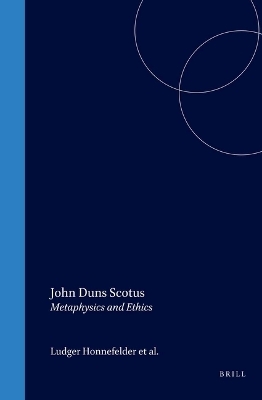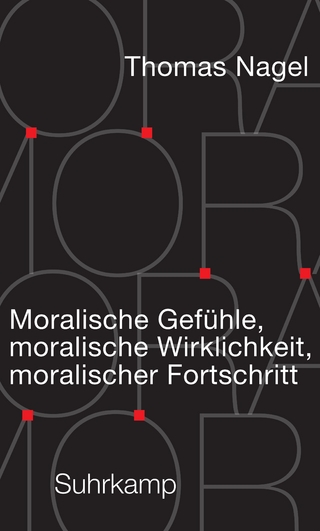
John Duns Scotus
Brill (Verlag)
978-90-04-10357-3 (ISBN)
'Of realty the rarest-veined unraveler', John Duns Scotus was one of the profoundest metaphysicians who ever lived. In this volume, the world's foremost Scotus scholars collaborate to present the latest research on his work. In ethics, the focus is on practical wisdom, on beauty as an ethical concept, and on the independence of the virtues; in metaphysics, on modality, individuation, and being. Textbook accounts notwithstanding, Scotus's theory of logical possibilities implies no existence or actuality for possible beings though being and thinking presuppose the domain of possibility; potency only supervenes on the actual. There are important 13th-century precursors of Scotus's theory of modality and individuation. Posterior to quidditative entity, Scotus clearly distinguishes the ultimate reality of individual beings both from individuals and from individuality.
Rega Wood, Ph.D. (1975), Cornell University, is a Professor at the Franciscan Institute, St. Bonaventure University. An editor of Scotus' philosophical works, she has also edited works by Ockham and Adam Wodeham. Ludger Honnefelder, Dr. phil. (1971), University of Bonn, is since 1988 Professor of Philosophy at the University of Bonn. He is the author of 2 monographs on Scotus and his Nachleben, Ens inquantum ens (1975) and Scientia transcendens, and has published extensively on metaphysics and ethics. Mechtild Dreyer, Dr. phil. (1980), University of Bonn, has published on the application of the axiomatic method in Antiquity and the Middle Ages. She has also edited the Ars Fidei Catholicae by Nicholas of Amiens and Scotus' Theoremata.
Vorwort Ludger Honnefelder
Historical Context
Reflections about Scotus's Early Works Stephen D. Dumont
William of Ware, Richard of Groningen and the Collationes Oxonienses of John Duns Scotus Mechthild Dreyer
Wissenschaft als Satzsystem. Die Theoremata desJohannes Dusn Scotus und die Entwickling des kateorisch-deduktiven wissenschaftsbegriffs Gordon A. Wilson
The Presence of Henry of Ghent in Scotus's Quaestiones super libros Metaphysicorum
Modality
Duns Scotus and the Foundation of Logical Modalities Simo Knuuttila
The Ontological Commitment of Scotus's Account of Potency in his Questions on the Metaphysics, Book IX John Boler
Scotus, Modality, Instants of Nature and the Contingency of the Present Calvin G. Normore
Revisiting Duns Scotus and Henry of Ghent on Modality Steven P. Marrone
Der Streit um den wahren Sinn der scotischen Possibilienlehre Stanislav Sousedik
Power and Contingency in Robert Grosseteste and Duns Scotus Neil Lewis
Individuation
Individuality and the Individuating Entity in Scotus's Ordinatio: An Ontological Characterization Jorge J.E. Gracia
Individual forms: Richard Rufus and John Duns Scotus Rega Woods
Inderstanding the Problem of Individuation: Gracia vs. Scotus Woosuk Park
Being and Univocity
Duns Scot, theoricien de l'analogie de l'etre Olivier Boulnois
Univozitat des Seienden - Univozitat der Person: Zwei Grenzbegriffe Stephen F. Brown
L'unite du concept d'etre au debut du quatorzieme siecle Stephen F. Brown
Das Seiende als transzendentaler oder supertranszendentaler Begriff. Deutungen der Univozitat des Begriffs bei Scotus und den Scotisten Theo Kobusch
Entdecken oder Setzen? Die Besonderheit der Relationistheorie des Duns Scotus und ihre Bedeutung fur die Metaphysik Jan P. Beckmann
Universel et natura communis dans l'Ordinantio et dans les Questions sur le Perihermeneias (Une breve comparison) Gerard Sondag
Utrum haec sit vera: Caesar est homo, Caesar est animal, Caesare non existente. Zum Peri-Hermeneias-Kommentar des Johannes Duns Scotus Jakob Hans Josef Schneider
The Existence of the First Being
Ens infinitum e dimostrazione dell'esistenza di Dio in Duns Scoto Alessandro Ghisalberti
From First Efficient Cause to God: Scotus on the Identification Stage of the Cosmological Argument Timothy O'Connor
Bedeutung und Grenzen des aristotelischen Denken im Gottesbeweis von Duns Scotus Luis Aberto de Boni
Negationes non summe amamus. Duns Scotus' Auseinandersetzung mit der negativen Theologie Rolf Schonberger
Ethics
Scotus and Ockham on the Connection of the Virtues MArilyn McCord Adams
Scotus' Gebrauch des Begriffs der praktischen Wahrheit im philosophiegeschichtlichen Kontext Fernando Inciarte
Die Erfassung des Schonen in seiner personalen und ethnischen Bedeutung bei Duns Scotus Hans-Joachem Werner
Practical Wisdom: Scotus's Presentation of Prudence Mary Elizabeth Ingham
Wille und Moral. Zur Voraussetzung der Ethik des Johannes Duns Scotus und ihrer Bedeutung fur die Ethik Immanuel Kants Hannes Mohle
Indices
| Erscheint lt. Verlag | 1.6.1996 |
|---|---|
| Reihe/Serie | Studien und Texte zur Geistesgeschichte des Mittelalters ; 53 |
| Co-Autor | Adams, Simo Knuuttila, Boler, Gracia, Boulnois |
| Verlagsort | Leiden |
| Sprache | englisch |
| Maße | 155 x 235 mm |
| Gewicht | 2257 g |
| Einbandart | Leinen |
| Themenwelt | Geisteswissenschaften ► Philosophie ► Ethik |
| Geisteswissenschaften ► Philosophie ► Metaphysik / Ontologie | |
| Geisteswissenschaften ► Philosophie ► Philosophie des Mittelalters | |
| ISBN-10 | 90-04-10357-0 / 9004103570 |
| ISBN-13 | 978-90-04-10357-3 / 9789004103573 |
| Zustand | Neuware |
| Informationen gemäß Produktsicherheitsverordnung (GPSR) | |
| Haben Sie eine Frage zum Produkt? |
aus dem Bereich


